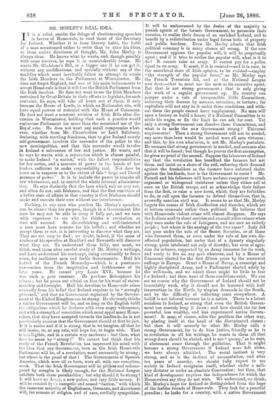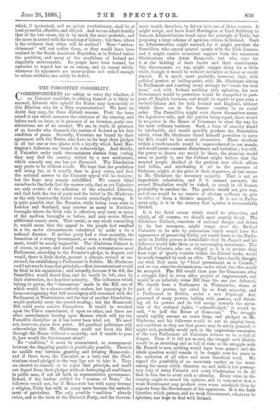MR. MORLEY'S REAL IDEA.
IT is a relief, amidst the deluge of electioneering speeches in favour of Home-rule, to read those of the Secretary for Ireland. Whether it is from literary habit, the habit of a man accustomed rather to write than to utter his ideas, or from native directness of thought, Mr. John Morley is always clear. He knows what he wants, and, though possibly with some reserves, he says it in unmistakeable terms. He wants Mr. Gladstone's Bill, or a bigger one if he can get it, without any modifications, and speeially without any of the muddles which must inevitably follow an attempt to retain the Irish Members in the Parliament at Westminster. He does not forget England, and one of his main inducements to accept Home-rule is that it will free the British Parliament from the Irish incubus. He does not want to see the Irish Members restrained by Great Britain in their efforts to legislate, for such restraint, he says, will take all heart out of them, if only because the House of Lords, in which no Nationalist sits, will have equal powers of restraint with the House of Commons. He does not want a constant revision of Irish Bills after dis- cussion in Westminster, holding that such a practice would embarrass Parliament far more than the occasional use of the Royal veto. He does not want any small compromise what- ever, whether from Mr. Chamberlain or Lord Salisbury, declaring, with startling frankness, that to give Ireland county self-government involves the surrender of the police to the new municipalities, and that this surrender would involve in Ireland a subversion of law and justice. He wants, and he says he wants, with a reiteration which is almost painful, -to make Ireland "a nation," with the fullest responsibilities for her action, and a measure of power in the hands of her leaders sufficient to make responsibility real. Nor does he leave us in suspense as to the extent of this" large and liberal measure of power." It is to include the power to remake all law whatsoever, and to control the whole internal administra- tion. He says distinctly that the laws which suit us may not, and often do not, suit Irishmen, and that the first condition of a better state of affairs in that country is that Irishmen should make and execute their own without our interference.
Nothing, to any man who ponders Mr. Morley's speeches, can be clearer than his purpose, though in a Government like -ours he may not be able to carry it fully out, and we turn with eagerness to see why he thinks- a revolution so
vast will succeed. So clear-thinking and well-instructed a man must have reasons for his beliefs ; and whether we accept them or not, it is interesting to discover what they are. They are not easy to find ; we doubt, indeed, if the mass of readets of his speeches at Bradford and Newcastle will discover what they are. To understand them fully, one must, we think, read them after careful study of Mr. Morley's writings, and have understood his contempt, rising occasionally to fierce scorn, for inefficient men and feeble Governments. Half his hatred of the French Monarchy—which is a passionate one—arises from the ineptitudes and feeblenesses of its later years. He cannot pity Louis XVI., because he was such a poor creature. He pardons Robespierre his crimes ; but he pours out vitriol on him for his want of states- manship and foresight. Half his devotion to Home-rule arises avowedly from his belief that Ireland requires to be "strongly governed," and that no Government organised by the Govern- ment of the United Kingdom can be strong. He obviously thinks a native Government will be, and so long as the English fulfil the obligations which he declares with even angry vehemence, and with a strength of conviction which must appal many Home- rulers, that they have accepted towards the landlords, he is not particularly anxious that the Government should at first be just. If it is native and if it is strong, that is, we imagine, all that he will desire, or, at any rate, will hope for, to begin with. That is intelligible, and in a certain way moderate ; but then, what does he mean by "strong ?" We cannot but think that his study of the French Revolution has impressed his mind with the idea that any Government, born as the Irish Home-rule Parliament will be, of a revolution, must necessarily be strong ; but where is the proof of that ? The Governments of Spanish America, which were all so born, were all, with one exception, weak. That the Irish Government will be pitiless and unham- pered by scruples is likely enough, for the National League exhibits both those peculiarities ; bat why should it be strong? It will have no Army, a new police, and very little money. It will be resisted by cn energetic and armed "faction," with which the immense majority of Englishmen, Germans, and Americans will, for reasons of religion and of race, cordially sympathise. It will be embarrassed by the desire of the majority to punish agents of the former Government, to persecute their enemies, to realise their dream of an enriched Ireland, and to benefit by a redistribution under legal forms both of property and public burdens. Even Mr. Morley admits that Irish political economy is in many classes all wrong. If the new Government opposes the popular will, it will be perpetually upset ; and if it tries to realise the popular will, what is it to do ? It cannot raise an army. It cannot pay for a police equal to an army. It must, if it is resisted—and it is sure, in the anarchical state of Irish opinion, to be resisted—employ "the strength of the popular force," as Mr. Morley says the French Terrorists did, and as the National League now does,—that is, must use the mob as its executive agent. But that is not strong government ; that is only giving the work of a regular government up. No country can prosper under a rule of irresponsible little Committees, enforcing their decrees by menace, ostracism, or torture; for capitalists will not stay in it under those conditions, and with- out them the people cannot have employment. No man will open a factory or build a house, if a National Committee is to settle his wages, or fix the limit he can ask for rent. Yet only a strong Government can dissolve these Committees, and what is to make the new Government strong ? Universal acquiescence? Then a strong Government will not be needed, any more than laws would be needed were all men virtuous ; and this, by his own admission, is not Mr. Morley's postulate. He assumes that strong government is needed, and assumes also that it will be found; but though he proves the first assumption, he gives no proof of the second. Suppose the labourers of Ireland say that the revolution has benefited the farmers but not them, and insist on a share of the soil, enforcing their demand against the freeholders as the farmers have enforced theirs against the landlords, how is the Goverument to resist ? Mr. Parnell and his followers will have no force competent to crush organised or widespread resistance unless they either call at once on the British troops, and so acknowledge their failure from the first, or raise a new force, which they are forbidden to do, or call upon the farmers to defend themselves, that is, avowedly sanction civil war. It seems to us that Mr. Morley forgets the causes of Irish disaffection and disorder, which are at bottom economic rather than political. He believes that with Home-rule violent crime will almost disappear. He says the Italians used to shoot sentries and commit other crimes when they were under the rule of foreigners, and are now an orderly people ; but where is the analogy of the two cases ? Italy did not pass under the rule of the Secret Societies, or of those who favoured them, or even under the rule of her own dis- affected population, but under that of a dynasty singularly strong, quite intolerant not only of disorder, but even of agra- rian disturbance, supported by an Army immense for its work, and ready to fire on any mob whatever, and by a House of Commons elected for the first fifteen years by the narrowest suffrage in Europe. Grant a House of Savoy, a conscript and highly disciplined Army, and a Parliament elected solely by the well-to-do, and we admit there might be little to fear fn. Ireland ; but then, none of those conditions exist. We can see no reason why the Government of Ireland should not be lamentably weak, why it should not be harassed with half insurrection in the North, by utopian demands in the South, and by the difficulty of collecting rents everywhere. A bailiff is not beloved because he is a native. There is a latent socialism in Ireland, so strong that even the British Govern- ment can scarcely keep it down ; and how should the far less powerful, less wealthy, and less experienced native Govern- ment? It may, of course, solve the problem the other way, by placing itself at the head of the discontented classes ; but then it will scarcely be what Mr. Morley calls a strong Government, for to do him justice, friendly as he is to revolution in all his writings, he wants in them all that wrong-doers should be abated, and is not" queasy," as he says, if abatement come through the guillotine. That it might become a strong Government if Ireland were left. alone, we have always admitted. The social instinct is very strong, and so is the instinct of accumulation, and after ten years of anarchy, we should fully expect to see society in Ireland reorganise itself, whether under a mili- tary dictator or under an absolute Convention ; but then, that kind of development requires the independence for which the Home-rulers say they do not wish. We understand, we think, Mr. Morley's hope for Ireland as distinguished from the hope of the feebler friends of Home-rule. They look for a peaceful paradise ; he looks for a country, with a native Government
which, if tyrannical, and on points revolutionary, shall be at least powerful, effective, and obeyed. And we can admit frankly that of the two views, his is by much the more probable, and the more in accord with the teaching of history ; but then, where is the evidence that either will be realised ? Mere "enfran- chisement" will not realise them, or they would have been realised in the South American Republics, or in Poland before the partition, and many of the conditions of Ireland are singularly unfavourable. Its people have been trained for centuries to regard law as an enemy, and an enemy which, whenever its opponents are unscrupulous and united enough to refuse evidence, can safely be defied.



































 Previous page
Previous page